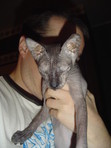"[W]e…need to re-assess the relationship between 'gay' & 'poetry.'
Surf on over to Lambda Literary Online and read a really quite wonderful interview between Stephen Motika and Brian Teare. Motika asks some excellent questions. And Teare covers some territory I'm most definitely interested in…for example, these remarks about Thom Gunn.
For many gay poets who came of age long before Gay Liberation, the passage from a pre-Stonewall poetics to a post-Stonewall poetics was a difficult one even if they were already out to themselves and their loved ones. On the one hand, they had already figured out a successful way to navigate a career in poetry either more (like Duncan) or less out (like Gunn); on the other, how out they were in their poetry did not necessarily correlate to how out they were socially, and vice versa. And though, in spite of major internal opposition, Gunn did eventually manage to answer the call to come out in his poems and engage both gay desire and leather culture as content, he did so at first at great expense to his reputation as a poet—Passages of Joy in particular was lambasted by many critics, a fact we tend to forget now, after the great critical and popular success of The Man with Night Sweats.
But given how difficult it was for him to engage gay subject matter in his poems, it was particularly instructive to watch Gunn respond to AIDS in his journals: the losses he sustained heightened a previously muted commitment to a gay community politics. His journals from the late '80s and early '90s show him determined to one day do justice in verse to a vanishing culture, the idealistic body politics of Gay Liberation. Many of the poems of Boss Cupid were written in almost ethnographic homage to a culture he saw as lost to AIDS, the foreground of that book being not only how loss but also how eros travels through the individual bodies of the body politic.
And Motika's question about "how you've come to define yourself as a poet and individual in relation to this myriad of affiliations in Northern California and at the national/international lever?….how your thinking about queer identity and community has shifted over the last decade?" leads to this:
If I could boil down the literary experience of my last eleven years into one sentence, it would be this: I don't have to choose. Which is to say, I no longer feel the necessity to be a certain kind of poet or to embody consistently one poetic tradition.
On the one hand, I think this has meant that my aesthetic appears to change a great deal from book to book, but I'd argue that, as Olson does in "The Kingfishers," "What does not change/is the will to change." Each of my books has generally represented a period of time in which I've explored a distinct set of formal, conceptual, experiential or thematic questions as variously as possible—and generally a book has ended when I no longer feel the desire or energy to engage with that set of questions. Often those formal, conceptual and thematic questions are most strongly tied to or inspired by my own experience, and so I also see the autobiographical impulse as a consistent connection between the books. It should be obvious that all along I've most admired poets like Brenda Hillman, whose work consistently responds on a formal and conceptual to the demands of lived experience.
On the other hand, I'm aware that the stance of "not having to choose" might at first appear politically problematic. How can a poet stand for something, if they won't stand still? I know some queer readers experienced Sight Map as a less "gay" book than The Room Where I Was Born or Pleasure, and some of these readers raised questions about the work's relationship to what we often call "gay poetry." Because I so often find its contemporary definitions problematic, I've explored the history of defining "gay poetry" quite often in my recent critical writing about poetry and poetics.
Some of the poets who've most inspired and given permission for these changes—Robert Duncan, Robin Blaser, Thom Gunn, Frank Bidart, Reginald Shepherd, and Aaron Shurin—are gay poets, and yet their work is, for very different reasons, often absent from mainstream discussions of "gay poetry." That they are all gay poets is a fact that many definitions of gay poetry have yet to take into account, though Timothy Liu's fabulous Word of Mouth collects them all (and many more) between its covers. Yet few critical accounts of gay poetry have been as generous and rigorous as Liu's, and I think it's fair to say that we as a community need to re-assess the relationship between "gay" and "poetry." I'd argue that both terms are far more stretchy than we generally allow them to be, and that this conceptual stretchiness is a quality that we too rarely take advantage of. It would be a political gift for us to reassess what it means for a body of poetry to be "gay"; it would be an aesthetic gift for us to reassess what it means for a gay-identified writer to work as a poet.











